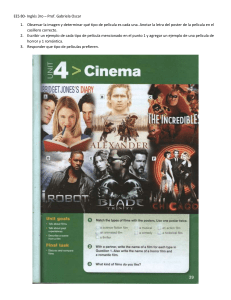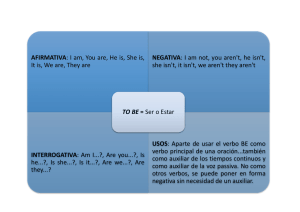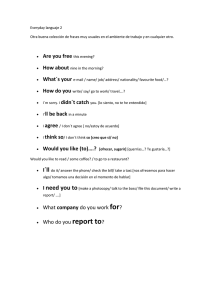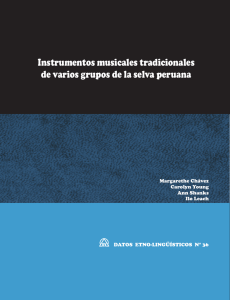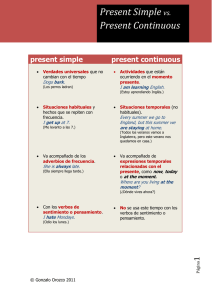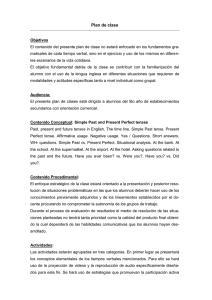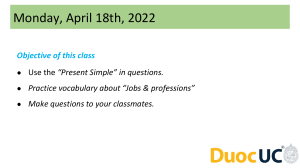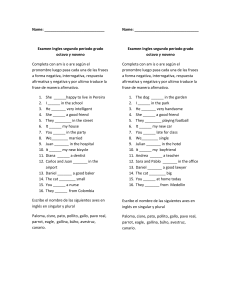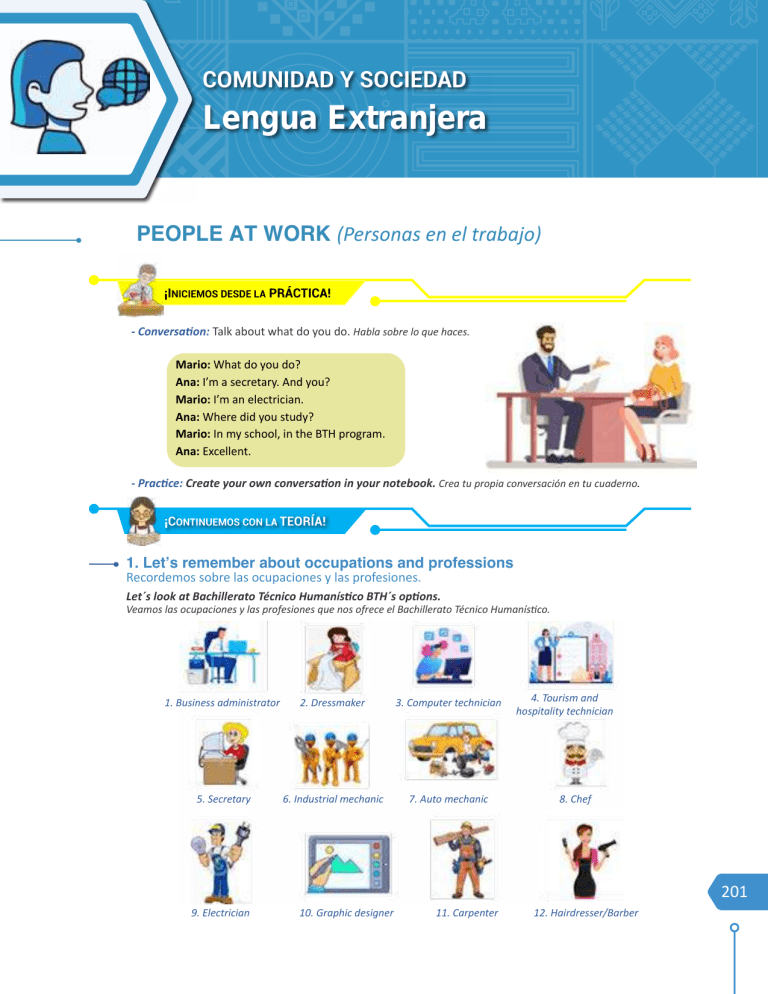
Primer Trimestre Lengua Extranjera
COMUNIDAD Y SOCIEDAD
Lengua Extranjera
PEOPLE AT WORK (Personas en el trabajo)
¡INICIEMOS DESDE LA PRÁCTICA!
- Conversation: Talk about what do you do. Habla sobre lo que haces.
Mario: What do you do?
Ana: I’m a secretary. And you?
Mario: I’m an electrician.
Ana: Where did you study?
Mario: In my school, in the BTH program.
Ana: Excellent.
- Practice: Create your own conversation in your notebook. Crea tu propia conversación en tu cuaderno.
¡CONTINUEMOS CON LA TEORÍA!
1. Let’s remember about occupations and professions
Recordemos sobre las ocupaciones y las profesiones.
Let´s look at Bachillerato Técnico Humanístico BTH´s options.
Veamos las ocupaciones y las profesiones que nos ofrece el Bachillerato Técnico Humanístico.
1. Business administrator
2. Dressmaker
3. Computer technician
5. Secretary
6. Industrial mechanic
7. Auto mechanic
4. Tourism and
hospitality technician
8. Chef
201
9. Electrician
10. Graphic designer
11. Carpenter
12. Hairdresser/Barber
Educación Secundaria Comunitaria Productiva
2. The simple present, past and future (Review)
El presente simple, pasado y futuro (Revisión)
- Grammar: The simple present – Affirmative form
Simple Present
I like that cake.
Me gusta el pastel
I
You
We
They
Maria and Roli
}
Afirmativa
SujetoSujeto
+ auxiliar
will ++ complemento
infinito del verbo +
+ complemento
verbo
Negativa
Sujeto
Sujeto+ +auxiliar
auxiliarwill
do/does
+ infinito
notdel
+ verbo
verbo++
complemento
Interrogativa
Auxiliar
+ sujeto
+ verbo
+ infinitivo
del verbo
Auxiliar will
do/does
+ sujeto
+ verbo
+ complemento
+ ­­?+ complemento
He
She
It
María
like those cakes.
}
likes those cakes.
Example: She likes those cakes too.
Example: We like those cakes.
Ella también gusta de esos pasteles.
Nos gustan esos pasteles.
- Grammar: The simple present – Negative form
Noticiencia
Did you know that, on
average, four thousand words
are added to the English
dictionary every year?
I don´t like fish.
No me gusta el pescado.
¿Sabías que, en promedio cada
año se añaden cuatro mil palabras
al diccionario de inglés?
I
You
We
They
Maria and Roli
}
He
She
It
María
don’t like fish
Example: They don’t like fish.
}
doesn’t like fish
Example: He doesn’t like fish.
A ellos no les gusta el pescado.
A él no le gusta el pescado.
- Grammar: The simple present – Interrogative form
Do
{
I
You
We
They
Maria and Roli
}
play volleyball?
Example: Do you play volleyball?
202
¿Tú juegas vóleibol?
Affirmative: Yes, I do
Sí, yo sí
Negative: No, I don´t
No, yo no.
Does
{
He
She
It
María
}
play volleyball?
Example: Does she play volleyball?
¿Ella juega vóleibol?
Affirmative: Yes, she does Negative: No, she doesn´t
Sí, ella sí.
No, ella no.
Primer Trimestre Lengua Extranjera
- Grammar: The simple past – Affirmative form
Simple Past
On my birthday I
liked to eat pizza.
Me gustó comer pizza
en mi cumpleaños
Afirmativa
Sujeto + verbo (-d, -ed) + complemento
Negativa
Sujeto + did not + verbo en forma básica +
complemento
Interrogativa
Did + sujeto + verbo en forma básica +
complemento
RECUERDA:
Escribir el verbo en pasado, puedes
agregar un adverbio de tiempo.
}
I
You
He
She
It
We
You
They
Examples:
You played tennis yesterday.
Tú jugaste tennis ayer.
I ate fruit in the morning.
played tennis yesterday.
Yo comí fruta en la mañana.
Juan y Ana danced Waka Waka last year.
Juan y Ana bailaron Waka Waka el año pasado.
- Grammar: The simple past – Negative form
Noticiencia
I didn´t go to school.
Yo no fui a la escuela.
Did you know: Set is the
English word with the largest
number of meanings?
¿Sabías que:
Set es la palabra en inglés con
mayor número de significados?
}
I
You
He
She
It
We
You
They
Examples:
They didn´t play soccer yesterday.
didn’t play soccer yesterday.
Ellos no jugaron futbol ayer.
She didn´t play soccer yesterday.
Ella no jugó futbol ayer.
We didn’t eat huminta in the morning.
Nosotros no comimos huminta en la mañana.
- Grammar: The simple past – Interrogative form
{ }
I
You
He
drink soda last night?
Did
She
It
We
You
They
Example: Did he drink soda last night?
¿Él tomó soda anoche?
Affirmative: Yes, he did Negative: No, she didn´t
Sí.
No.
Yes,
No,
{
{
I
You
She
It
We
You
They
}
}
did
didn’t
203
Educación Secundaria Comunitaria Productiva
- Grammar: Future – Affirmative form
I will go to the park tomorrow
Yo iré al parque mañana.
I
You
He
She
It
We
You
They
}
Future
Afirmativa
Sujeto + auxiliar will + infinito del verbo +
complemento
Negativa
Sujeto + auxiliar won´t + infinito del verbo +
complemento
Interrogativa
Auxiliar will + sujeto + verbo + infinitivo del verbo
+ complemento + ­­?
RECUERDA:
Escribir el verbo en su forma presente, ya
que el WILL transforma toda la oración en
futuro. y un adverbio de tiempo futuro.
Example:
María will cook soup tomorrow.
will cook soup tomorrow.
Maria cocinará sopa mañana.
We will cook soup tomorrow.
Nosotros cocinaremos sopa mañana.
He will buy a new computer next week.
Él comprará una nueva computadora la siguiente semana.
- Grammar: Future – Negative form
It go
won’t
I will
to therain
park today.
tomorrow
Noallloverá
Yo ire
parquehoy.
maña
I
You
He
She
It
We
They
}
RECUERDA:
Escribir el verbo en su forma presente.
Example:
We won’t work tomorrow.
won’t work tomorrow.
Nosotros no trabajaremos mañana.
He won’t work tomorrow.
Él no trabajará mañana.
I won’t drink soda this month.
- Grammar: Future – Interrogative form
204
{}
Will
I
You
He
She
It
We
You
They
Example: Will you go to the cinema this weekend?
Tu irás al cine este fin de semana?
Affirmative: Yes, I will. Negative: No, I won’t.
go to the
cinema this
weekend?
Sí, yo sí .
No, yo no.
Example: Will she wash her clothes today?
Ella lavará sus ropas hoy?
Affirmative: Yes, she will. Negative: No, she won’t.
Sí, ella sí.
No, ella no.
Example: Will they buy a new house?
Ellos comprarán una casa nueva?
Affirmative: Yes, They will. Negative: No, They won’t.
Primer Trimestre Lengua Extranjera
3. Regular and Irregular verbs (Review).
Verbos regulares e irregulares (Repaso)
- Regular Verbs.
Add -ed to the verb in the simple past tense. If the verb ends in -e, it only add -d.
Añade -ed al verbo en el tiempo pasado simple. Si el verbo termina en -e, solo aumenta -d.
PRESENT
Jugar
play
llamar
call
cepillar
brush
coninar cook
limpiar
clean
finalizar finish
besar
kiss
SIMPLE PAST
played
called
brushed
cooked
cleaned
finished
kissed
PRESENT
SIMPLE PAST
gustar
like
liked
decidir
decide decided
creer
believe believed
cerrar
close
closed
bailar
dance danced
prometer promise promised
usar
use
used
Example: I called my mother yesterday.
Yo llamé a mi mamá ayer.
- Irregular Verbs.
PRESENT
ser/estar be
poder
can
hacer
do
dibujar
draw
comer
eat
caer
fall
ir
go
tener
have
comprar buy
SIMPLE PAST
was/were
could
did
drew
ate
fell
went
had
bought
PRESENT
drive
cut
feel
read
see
sleep
swim
write
drink
conducir
cortar
sentir
leer
ver
dormir
nadar
escribir
tomar
SIMPLE PAST
drove
cut
felt
read
saw
slept
swam
wrote
drank
Example: She went to the school yesterday.
Ella fue al colegio ayer.
- Pronunciation. The Simple Past tense ending. (Terminación del pasado simple.)
1. /d/2. /t/
played =
play /d/
liked
=
like /t/
listened =
listen /d/
washed =
wash /t/
exercised =
exercise /d/
shopped =
shop /t/
3 . /Id/
wanted =
needed =
want /Id/
need /Id/
REMEMBER: Verbs in English are divided into regular and irregular. Regular
verbs in English are those that only need to add the ending “ed” to form
their past tense and participle. Instead, irregular verbs have different forms
for the past tense and participle of each verb. That is why you have to learn
them by heart
RECUERDA: Los verbos en inglés se dividen en regulares e irregulares. Los verbos
regulares en inglés son aquellos que para formar su tiempo pasado y participio solo
necesitan añadir la terminación “ed”. En cambio, los verbos irregulares tienen diferentes formas para
el pasado y participio de cada verbo. Es por ello que te los tienes que aprender de memoria.
4. Past participle of regular and irregular verbs.
Pasado participio de los verbos regulares e irregulares
Verbs in the past participle are used with the auxiliary have and has.
Los verbos en pasado participio se usan con el auxiliar have y has.
205
Educación Secundaria Comunitaria Productiva
REGULAR VERBS
PRESENT
SIMPLE PAST
PAST PARTICIPLE
jugar
play
played
played
llamar
call
called
called
cepillar brush
brushed
brushed
coninar
cook
cooked
cooked
limpiar clean
cleaned
cleaned
finalizar finish
finished
finished
gustar
like
liked
liked
decidir
decide decided
decided
creer
believe believed
elieved
cerrar
close
closed
closed
bailar
dance danced
danced
prometer promise promised
promised
besar
kiss
kissed
kissed
responder answer answered
answered
entregar deliver delivered
delivered
vivir
live
lived
lived
abrir
open
opened
opened
Example: I have danced caporales twice.
Yo he bailado caporales dos veces.
IRREGULAR VERBS
PRESENT
SIMPLE PAST
PAST PARTICIPLE
ser/estar be
was/were
been
luchar
fight
fought
fought
hacer
do
did
done
dibujar
draw
drew
drawn
comer
eat
ate
eaten
conocer meet
met
met
ir
go
went
gone
tener
have
had
had
comprar buy
bought
bought
hablar
speak spoke
spoken
cortar
cut
cut cut
sentir
feel
felt
felt
leer
read
read
read
ver
see
saw
seen
dormir
sleep slept slept
nadar
swim swam
swum
escribir
write wrote
written
tomar
drink
drank
drunk
Example: She has eaten fish once this month.
Ella ha comido pescado una vez este mes.
- Conversation:
Let´s read and listen this conversation using the past participle, then repeat again. (Leemos y escuchemos esta conversación
usando el pasado participio, luego repitamos nuevamente)
Jhoselin: Alan, have you met Carla?
Alan, conociste a Carla?
Alan: No, I haven’t.
No, yo no.
Jhoselin: Carla, I would like you to meet Alan.
Carla, me gustaría presentarte a Alan.
Loida: Hi, Alan. Nice to meet you.
Hola, Alan. Mucho gusto.
Alan: Nice to meet you too.
También, mucho gusto.
5. Factory working tools. (According to B.T.H.’s career)
Herramientas de trabajo de fábrica. (Según la carrera del Bachillerato Técnico Humanístico)
- Reading:
What is a tool? ¿Qué es una herramienta?
Tools are instruments that are used to carry out a specific job or task, such as building
a bed, a table, or even more complex things such as buildings or bridges. There are
many types of tools.
Las herramientas, son instrumentos que se utilizan para llevar a cabo un trabajo o tarea
específica, como construir una cama, una mesa, o incluso cosas más complejas como edificios o
puentes. Existes muchos tipos de herramientas.
- Vocabulary: Let´s read and practice in pairs.
Mechanical Tools
Herramientas mecánicas
206
Primer Trimestre Lengua Extranjera
Electric Tools
Herramientas eléctricas
¡REALICEMOS LA VALORACIÓN!
Let’s carry a role-play in groups, representing the action of an activity and naming the mechanical
and electrical tools.
Realicemos un juego de roles en grupo, representando la acción de una actividad y nombrando las herramientas
mecánicas y eléctricas.
¡ES HORA DE LA PRODUCCIÓN!
Let´s write a conversation using the vocabulary learned in this unit.
Escribamos una conversación utilizando el vocabulario aprendido en esta unidad.
BOLIVIAN HEROES (Héroes bolivianos)
¡INICIEMOS DESDE LA PRÁCTICA!
The story goes that, in February 1879, Genoveva Ríos, had 14 years old,
protected the Bolivian flag from Antofagasta intendance building, during the
Chilean invasion of the Bolivian port, which started the War of the Pacific,
this act was considered heroic because our flag is a very important symbol of
the country.
Cuenta la historia que, en febrero de 1879, Genoveva Ríos, en ese entonces de 14
años de edad, protegió la bandera boliviana desde el edificio de la Intendencia de la
Policía de Antofagasta, durante la invasión chilena al puerto boliviano, que dio inicio a
la Guerra del Pacífico, este acto se consideró heroico debido a que nuestra bandera es
un símbolo muy importante del país.
- Practice
Let´s answer the questions in our notebook.
(Respondamos las preguntas en nuestro cuaderno)
1. What was the name of the Bolivian heroin?
2. What year did it happen?
3. Where did it happen?
Noticiencia
¿Sabías que Screeched (chilló)
es la palabra monosílaba más
larga de todas?
207
Educación Secundaria Comunitaria Productiva
¡CONTINUEMOS CON LA TEORÍA!
1. Important people in our community
Personas importantes en nuestra comunidad.
Let´s write and repeat with the correct pronunciation of the
presented texts and we expose in oral form.
Leemos y repetimos con la correcta pronunciación de los textos presentados a continuación y exponemos de manera oral.
- Vocabulary: be inspired by, be influenced by, be fascinated by.
Desafío
We translate the
biography of each
character.
Traducimos la biografía de cada
personaje.
- Vocabulario: ser inspirado por, estar influenciado por, estar fascinado por.
Inspire: To make someone feel that they want to do something and can do it.
Hacer sentir a alguien que quiere hacer algo y que puede hacerlo.
Be inspired by
Noticiencia
Example:
• Adela Zamudio’s work inspires Rosio Pozorrico.
Lo creas o no, ningún número
del 0 al 999 en inglés contiene
la letra a.
La obra de Adela Zamudio inspira a Rosio Pozorrico.
Rosio Pozorrico is inspired by the work of Adela Zamudio.
Rosio Pozorrico es inspirada por la obra de Adela Zamudio.
Influence: To affect or change how someone or something develops, behaves or thinks.
Afectar o cambiar la forma en que alguien o algo se desarrolla, se comporta o piensa.
Be influenced by
Example:
• Bonny Lovy’s songs influences Elias Ayaviri.
Las canciones de Bonny Lovy influyen en Elias Ayaviri.
Elías Ayaviri is influenced by the song of Bonny Lovy.
Elías Ayaviri es influenciado por las cancioes de Bonny Lovy.
208
Aprende
haciendo
We write five sentences
similar to the examples
given.
Escribe 5 oraciones similares a
los ejemplos realizados.
Primer Trimestre Lengua Extranjera
Fascinate: To interest someone a lot.
Interesar mucho a alguien.
Be fascinated by
Example:
• Cristiano Ronaldo’s play fascinates Mario Paz.
El juego de Cristiano Ronaldo fascina a Mario Paz.
Mario Paz is fascinated by the play of Cristiano Ronaldo.
Mario Paz está fascinado por el juego de Cristiano Ronaldo
- Conversation:
Let´s practice the conversation in pairs. (Practiquemos la conversación en pares)
Marco: Do you have any Bolivian heroine that has inspired you?
Sofía: Yes, I do. I am inspired by Adela Zamudio.
Marco: What inspired you about her?
Sofía: She wrote beautiful poems.
Marco: And do you write poems?
Sofía: Yes, I do.
Marco: Nice!
2. Present perfect tense: Affirmative and negative
Tiempo presente perfecto: Afirmativo y negativo.
Present Perfect
- Grammar: The present perfect – Affirmative form
Use the present perfect to talk about an indefinite time in the past. And remember that the difference with the
simple past tense is that it is used to talk about a defined or specific time.
Usa el presente perfecto para hablar de un tiempo indefinido en el pasado. Y recuerda que la diferencia con el tiempo pasado
simple, es que este, se usa para hablar sobre un tiempo definido o específico.
Present Perfect: Indefinite time
Simple Past tense: Definite time
I’ve met María twice.We met in 1999 and again in 2004.
Me he encontrado dos veces con María.
Nos encontramos en 1999 y nuevamente en 2004.
Form the present perfect using HAVE or HAS and the third row of the list of verbs learned, that is, the past
participle of a verb, whether regular or irregular.
Forma el presente perfecto usando el HAVE o HAS y la tercera fila de la lista de verbos aprendido, es decir el pasado participio
de un verbo ya sea regular o irregular.
PRESENT
jugar
play
llamar
call
cepillar brush
REGULAR VERBS
SIMPLE PAST
PAST PARTICIPLE
played
played
called
called
brushed
brushed
PRESENT
ser/estar be
luchar
fight
hacer
do
IRREGULAR VERBS
SIMPLE PAST
PAST PARTICIPLE
was/were
been
fought
fought
did
done
I have been in Tiwanaku 3 times.
Yo he estado en Tiwanaku 3 veces.
Afirmativa: Sujeto + have/has + verbo past participle + complemento.
209
Educación Secundaria Comunitaria Productiva
}
I
You
We
They
Maria and Roli
have played football.
Example: You have played football.
Tú has jugado futbol
He
She
It
María
}
has played basket in the park.
Example: She has played basket in the park once.
Ella ha jugado en el parque una vez
- Grammar: The present perfect – Negative form
I haven´t called you.
Yo no te he llamado.
Negativo: Sujeto + have/has + not + verbo past participle +
complemento.
}
I
You
We
They
Maria and Roly
haven’t eaten chicken for a
month
Example: We haven’t eaten chicken for a month.
Nosotros no hemos comido pollo por un mes.
He
She
It
María
Example: She hasn’t seen Sofía for a year.
Ella no ha visto a Sofía por un año
Noticiencia
Contractions
have met
=
has met
=
have not met =
has not met =
}
hasn’t seen Sofía for a year.
’ve met
’s met
haven’t met
hasn’t met
¿Sabías que la “E” y la “R”
son las letras más utilizadas
en inglés?
- Pronunciation: Sound reduction in the present perfect.
- Pronunciación: Reducción de sonido en el presente perfecto.
We listen to how the sound /t/ of the negative contraction “disapears” and then repeat again.
Escuchamos como el sonido /t/ de la contracción negativa “desaparece” y luego repetimos nuevamente.
1. I haven’t been to that class.
3. He hasn’t met his new teacher.
2. They haven’t taken the test.
4. She hasn’t heard the news.
2. Linking words: but, however.
Palabras de enlace: pero, sin embargo.
210
"But" is a conjunction that can be translated as
"but", and
"However" is an adverb that can be translated
as "without"
“But” es una conjunción que se puede traducir
como “pero”, y
“However” es un adverbio que se puede
traducir como “sin”
Primer Trimestre Lengua Extranjera
¡REALICEMOS LA VALORACIÓN!
Pair work: let´s write a conversation with your partner, talk about an important Bolivian person
using the example of the lesson.
(Trabajo en parejas: Completemos la conversación con el compañero, hablemos sobre una importante persona boliviana
usando el ejemplo de la lección)
¡ES HORA DE LA PRODUCCIÓN!
Let´s write affirmative and negative sentences with the PRESENT PERFECT
using the grammatical structures.
Escribimos oraciones afirmativas y negativas con el PRESENTE PERFECTO utilizando las
estructuras gramaticales.
WHERE HAVE YOU BEEN? (¿Dónde has estado?)
¡INICIEMOS DESDE LA PRÁCTICA!
Let´s answer this question with yes or no.
(Respondemos esta pregunta con: yes o no)
• Have you been to Colombia?
¿Has estado en Colombia?
¡CONTINUEMOS CON LA TEORÍA!
1. Present perfect tense: Interrogative
Tiempo presente perfecto: Interrogativo.
- Grammar: The present perfect – Interrogative form
}
Have
}
I
you
we
you
they
called Juan Carlos?
Example: Have you called Juan Carlos?
Tú le has llamado a Juan Carlos ?
Affirmative: Yes, I have. Negative: No, I haven’t.
Sí.
No.
Has
{}
he
she
it
called Juan Carlos?
Example: Has she called Juan Carlos?
Ella le ha llamado a Juan Carlos ?
Affirmative: Yes, she has. Negative: No, she hasn’t.
Sí.
No.
211
Educación Secundaria Comunitaria Productiva
2. Short answers: for, since
Respuestas cortas: para, desde.
“For” is a preposition that can be translated as “para”, and
"since" is a preposition that can be translated as "desde"
3. Information questions: When? – How long?
Preguntas de información: ¿Cuándo? - ¿Cuánto tiempo?
Let’s make information questions using have or has then write the verb in the past participle in
our notebook.
When have we played soccer?
How long have you played basketball?
When has he eaten fish?
How long has she eaten rice?
¿Cuándo nosotros hemos jugado futbol?
¿Cuándo él ha comido pescado?
¿Por cuánto tiempo tú has jugado basquetbol?
¿Por cuánto tiempo ella ha comido arroz?
¡REALICEMOS LA VALORACIÓN!
Pair work: let´s complete the conversations in pairs using the Present Perfect.
Trabajo en pareja: Completemos las conversaciones en pares. Utilizando el
Presente Perfecto.
1. A: ...........................................
our new teacher?
Has Maria met
María / meet
B: Yes, she ……………..
has
2. A: …………………………………………….. on this class before?
They/be
B: No, they ……………………...
Aprende
haciendo
Let’s form pair groups and
write ten sentences.
Conformemos grupos de dos y
escribamos 10 oraciones.
3. A: …………………………………………….. with the school Director?
You/speak
B: Yes, I ………………….
¡ES HORA DE LA PRODUCCIÓN!
Let´s write some sentences using since and for in our notebook. (Escribimos unas oraciones usando
since y for en nuestros cuadernos)
212
Example:
a) I have lived in this house since 1997.
b) We have lived in this house for thirty years.
Segundo Trimestre Lengua Extranjera
TOURISTIC PLACES AROUND BOLIVIA (Lugares
turísticos alrededor de Bolivia)
¡INICIEMOS DESDE LA PRÁCTICA!
Let´s describe a favorite touristic place in Bolivia.
Describimos un lugar turístico favorito en Bolivia.
¡CONTINUEMOS CON LA TEORÍA!
1. Reading: Let´s read about Uyuni salt flat
Lectura: Leemos sobre el salar de Uyuni
The Uyuni salt flat is the largest continuous and high salt desert in the world, with
an area of 10,582 km². It is located at about 3,650 meters above sea level in southwestern Bolivia, in the province of Daniel Campos, in the department of Potosí,
it is considered one of the largest in the world. It’s a touristic place.
2. Adjectives and adverbs: quick – quickly
Adjetivos y adverbios: rápido – rápidamente
- Examples:
María had a quick trip to Cochabamba.
María tuvo un viaje rápido a Cochabamba.
They wrote quickly because the exam time
was over.
Ellas escribieron rápidamente porque el tiempo del
examen había terminado.
3. The present perfect: already, yet, before
- Grammar:
Use yet o already en preguntas sobre experiencias recientes.
Have you toured Chuquisaca yet?
Has she already tried Majadito camba?
Use already en oraciones afirmativas. Usa yet en oraciones negativas.
I’ve already tried Pique macho.
I haven’t tried Fricase yet.
Use before en preguntas sobre experiencias de vida.
Have you eaten food from Cochabamba before?
Has she been to Uyuni before?
4. Adverb clauses of time: Form
Cláusulas adverbiales de tiempo: Forma.
Adverbial clauses of time show the time when something happens, they are subordinate clauses,
they can help join sentences, or go to the beginning of a sentence to emphasize the time.
Las cláusulas adverbiales de tiempo muestran el tiempo cuando sucede algo, son cláusulas subordinadas, pueden ayudar a unir
oraciones, o ir al principio de una oración para enfatizar el tiempo.
213
Educación Secundaria Comunitaria Productiva
- Example:
I always take a bath before I go to bed.
Yo siempre tomo una ducha antes de ir a la cama.
Will you wait here until I am ready?
Esperarás aquí hasta que estes lista?
After I have finished my work, I will accompany you to the
park.
Después de que haya terminado mi trabajo, te acompañaré al
parque.
5. Separable Phrasal verbs.
Phrasal verbs separables
The phrasal verbs are two or more words that together act as a completely new word, with a meaning
separate from the original words.
Los phrasal verbs son dos o más palabras que juntas actúan como una palabra completamente nueva, con un
significado separado de las palabras originales.
The separable Phrasal verb means that it can be separated by another word that goes in between the
verb and the particle. This word is usually the subject that the phrasal verb is referring to.
Un Phrasal verb separable significa que puede ser separado por otra palabra que va entre el verbo y la partícula.
Esta palabra suele ser el sujeto al que se refiere el phrasal verb.
Example: Put On (poner): I’ll put my jacket on (Me pondré mi chaqueta)
I took off my shoes.
Me quité los zapatos.
Te volveremos a llamar
mañana.
Me quité los zapatos.
Por favor, apaga la luz.
I took my shoes off.
I’ll pick you up later.
Te recogeré más tarde.
We’ll call you back
tomorrow.
Please, turn off the light.
Rosa fill out the test.
Rosa llena el examen.
RECUERDA:
Cualquiera de las dos formas tiene el
mismo significado.
¡REALICEMOS LA VALORACIÓN!
Let´s investigate about the most famous touristic places in our country Bolivia.
(Investigamos sobre los lugares turísticos más famosos de nuestro país Bolivia.)
¡ES HORA DE LA PRODUCCIÓN!
214
Let´s play the memory game, where each group have to go in front of the class, then write more
separable Phrasal verbs and adverb clauses of time. Each group will have a determined time by
the teacher. Let´s enjoy it!
Jugamos el juego de memoria, donde cada grupo tiene que ir al frente de la clase y luego escribimos más Phrasal verbs
separables y adverbios de tiempo. Cada grupo tendrá un tiempo determinado por el maestro(a). ¡Disfrutemos!
Segundo Trimestre Lengua Extranjera
MY BOLIVIA (Mi Bolivia)
¡INICIEMOS DESDE LA PRÁCTICA!
•
•
Let´s answer this question. (Respondemos esta pregunta)
How much of your country do you know?
•
Let´s describe the most relevant characteristics of our country. (Describimos las características
•
¿Cuánto de tu país conoces?
más relevantes de nuestro país)
¡CONTINUEMOS CON LA TEORÍA!
1. Activities around Bolivia
Actividades alrededor de Bolivia
- Vocabulary:
Climb the Illimani Mountain.
Escalar la montaña Illimani
Try food from Cochabamba.
Probar la comida de Cochabamba.
Go sightseeing to Killi Killi.
Ir a dar un vistazo al Killi Killi.
Take a tour of the Glorieta Castle.
Tomar un tour por el Castillo Glorieta.
Go to the top of the Virgencita.
Ir a la cima de la Virgencita.
Take pictures of Samaipata.
Tomar fotos de Samaipata
2. Protected areas in Bolivia
Áreas protegidas en Bolivia.
- National parks:
National park Amboró
National park Madidi
National park Tipnis
National park Iñau
3. Modal: Would (affirmative, negative, and interrogative forms)
Modal: haría (formas afirmativa, negativa e interrogativa).
Would is an auxiliary verb - a modal auxiliary verb. We use would mainly to: talk about the past. talk
about the future in the past. In Spanish add “ría” to base verb.
Sería es un verbo auxiliar - un verbo auxiliar modal. Usamos would principalmente para: hablar del pasado. hablar
del futuro en el pasado. En español agregar “ría” al verbo base.
215
Educación Secundaria Comunitaria Productiva
Afimative
Forma larga
Forma corta
Traducción
I would work
I'd work
Yo trabajaría
You would work
You'd work
Tú trabajarías
He would work
He'd work
Él trabajaría
She would work
She'd work
Ella trabajaría
It would work
It'd work
Eso trabajaría
We would work
We'd work
Nosotros trabajaríamos
You would work
You'd work
Ustedes trabajarían
They would work
They'd work
Ellos/ellas trabajarían
Example:
I would marry him if I loved him.
Me casaría con él si lo quisiera.
Negative
Forma larga
Example:
I wouldn’t dance if I didn’t like to dance.
Yo no bailaría si no me gustara bailar.
Forma corta
Traducción
I would not dance
I wouldn't dance
Yo no bailaría
You would not dance
You wouldn't dance
Tú no bailarías
He would not dance
He wouldn't dance
Él no bailaría
She would not dance
She wouldn't dance
Ella no bailaría
It would not dance
It wouldn't dance
Eso no bailaría
We would not dance
We wouldn't dance
Nosotros no bailaríamos
You would not dance
You wouldn't dance
Ustedes no bailarían
They would not dance
They wouldn't dance
Ellos/ellas no bailarían
Interrogative
Forma larga
Forma negativa
Forma corta
Traducción
Would I work...?
Would I not work...?
Wouldn't I work...?
¿Yo no trabajaría...?
Would you work...?
Would you not work...?
Wouldn't you work...?
¿Tú no trabajarías...?
Would he work...?
Would he not work...?
Wouldn't he work...?
¿Él no trabajaría...?
Would she work...?
Would she not work...?
Wouldn't she work...?
¿Ella no trabajaría...?
Would it work...?
Would it not work...?
Wouldn't it work...?
¿Eso no trabajaría...?
Would we work...?
Would we not work...?
Wouldn't we work...?
¿Nosotros no
trabajaríamos...?
Would you work...?
Would you not work...?
Wouldn't you work...?
¿Ustedes no
trabajarían...?
Would they work...?
Would they not work...?
Wouldn't they work...?
¿ Ellos/ellas no
trabajarían...?
Example:
Would you like chicken?
Te gustaría pollo?
4. Vocabulary: Relaxing, exciting, terrific, unusual, incredible, etc.
Vocabulario: Relajante, emocionante, fabuloso, inusual, increíble, etc.
Relaxing - Relajante
216
Exciting - Emocionante
Terrific - Fantástico
Unusual - Inusual
Incredible - Increible
¡REALICEMOS LA VALORACIÓN!
Let´s write a short story about the care and conservation of touristic places and then socialize in class.
(Escribimos una historia pequeña sobre el cuidado y conservación de los lugares turísticos y luego socialicemos en la clase.)
Segundo Trimestre Lengua Extranjera
¡ES HORA DE LA PRODUCCIÓN!
In groups, let´s write sentences using modal Would
En grupos, escribimos oraciones utilizando modal Would
BOLIVIAN TYPICAL FOOD (Comida típica boliviana)
¡INICIEMOS DESDE LA PRÁCTICA!
•
Let´s answer the following question and why?
•
What is your favorite typical food? Why?
•
•
•
Respondemos a la siguiente pregunta y ¿Por qué?
¿Cuál es tu comida típica favorita? ¿Por qué?
más relevantes de nuestro país)
1. Gastronomy terms, BTH.
Términos gastronómicos, BTH.
Aprende
haciendo
Let´s make groups and perform a dramatization of
a TV cooking program and teach a typical dish using
the vocabulary learned.
Formamos grupos y realizamos la dramatización de un
programa de cocina de TV y enseñamos un plato típico
utilizando el vocabulario aprendido.
2. Typical Foods.
Comidas típicas.
217
Silpancho
Plato paceño
Majadito
Sopa de maní
Educación Secundaria Comunitaria Productiva
Recipe and preparation of peanut soup. Receta y preparación de la sopa de maní.
Peanut soup is one of the most delicious soups in Bolivia.
La sopa de maní es una de las sopas más deliciosas de Bolivia.
Ingredientes
6 nudos de carne de cordero o
costilla de vaca
1 cuchara de sal molida
6 papas
½ taza de arvejas
½ taza de habas verdes
1 taza de maní molido
3 litros de agua para cocer la
carne
1 taza de cebolla
½ taza de tomate
1 cucharilla de comino
2 dientes de ajo
1 cuchara de orégano
1 cuchara de perejil
1 ½ cuchara de ají amarillo molido
¼ taza de aceite
Ingredients
6 knots of lamb meat or beef rib
1 tablespoon of ground salt
6 potatoes
½ cup of peas
½ cup of green beans
1 cup of ground peanuts
3 liters of water to cook the meat
1 cup onion
½ cup tomato
1 teaspoon cumin
2 garlic cloves
1 tablespoon of oregano
1 tablespoon of parsley
1 ½ tablespoons of ground yellow
chili
¼ cup oil
PREPARATION
Cut the peeled potatoes in quarters, peel the peas,
chop the small onion and the peeled tomato. Fry the
onion in the oil in a pot, put the 3 liters of water on
the fire. Before it starts to boil, add the meat. Bring
to a boil and put the salt, tomato, onion, cumin, chili
pepper and garlic roasted in oil. Then add the ground
peanuts. Let´s cook until the meat is soft and cooked.
Pour the lima beans, peas, and potatoes. Cook until
soft. Serve in a deep dish, with a piece of meat and
garnish with parsley.
PREPARACIÓN
Corta las papas peladas en cuatro, pele las arvejas,
pique la cebolla menuda y el tomate
pelado. Fría
la cebolla en el aceite en una olla ponga al fuego los 3
litros de
agua.
Antes que empiece a hervir,
agréguele la carne. Deje dar un hervor y ponga la sal,
el tomate, la cebolla, el comino, orégano, el ají y
el
ajo retostado en
aceite. Agregar el maní molido.
Deje cocer hasta que la carne quede blanda y cocida.
Vierte las habas, las arvejas y las papas. Cocine hasta
que estén suaves.
Sirva en plato hondo, con un pedazo de carne y
adorne
con el perejil.
¡REALICEMOS LA VALORACIÓN!
Let´s listen to short stories and then dialogue in groups.
(Escuchemos pequeños cuentos y luego dialoguemos en grupos.)
¡ES HORA DE LA PRODUCCIÓN!
It’s time to make our own recipe! In groups, let´s choose a typical dish from our
wonderful country, then translate the recipe, finally expose it in class.
¡Es hora de hacer nuestra propia receta! En grupos, elegimos un plato típico de nuestro
país maravilloso, luego traducimos la receta, finalmente lo exponemos en clase.
218
Let´s remember to use the learned terms and have fun!
¡Tenemos que recordar usar los términos aprendidos y divertirnos!
Tercer Trimestre Lengua Extranjera
SURVIVING ON THE INTERNET (Sobreviviendo en el
internet)
¡INICIEMOS DESDE LA PRÁCTICA!
Let´s practice this conversation in pairs. (Practiquemos esta
conversación en pares)
A: What´s the problem?
B: Well, I clicked on the toolbar to save a file and the computer
crashed.
A: Why don’t you try restarting? That sometimes works.
B: OK. I´ll give that a try.
¡CONTINUEMOS CON LA TEORÍA!
1. Computer terms and commands
Términos y comandos informáticos.
Let´s write in our notebook the computer parts and their meaning.
(Escribamos en nuestro cuaderno las partes de la computadora y su significado)
2. Reading: social network.
Lectura: red social.
What do you mean by social network?
Let’s write which social
network we use the most
and why in our notebook.
(Escribamos qué red
social usamos más y por
qué en nuestro cuaderno)
3. Advantages and disadvantages
about the internet. Ventajas y desventajas
……………………………………
……………………………………
……………………………………
…………………………………....
The term social networking refers to the use of internet-based
social media sites to stay connected with friends, family, colleagues, or customers. Social networking can have a social purpose, a business purpose, or both, through sites like Facebook,
Twitter, Instagram, and Pinterest.
sobre el internet
219
Educación Secundaria Comunitaria Productiva
4. Comparison of adjectives with as … as/than
Comparación de adjetivos con tan …como/que.
Let´s write sentences with the following
adjectives. (Escribamos oraciones con los
siguientes adjetivos)
tall
brave
interesting beautiful
intelligent clever short
1. I am as tall as my sister.
2. ………………………………………………………..
3. ………………………………………………………..
4. ………………………………………………………..
5. ………………………………………………………..
6. ………………………………………………………..
5. Modals: Have to, Should and must to.
Modales: tengo que, debería y se debe a.
MUST TO
• Official, written rule: You must be 18 or older to vote.
• Duty or strong moral obligation: You must respect your parents.
SHOULD
HAVE TO
• Personal obligation, weaker than “must”: I should eat more vegetables.
• Used in place of “must” when speaking NOT a modal verb: She has to finish the report by 5:00.
¡REALICEMOS LA VALORACIÓN!
Pair work: Let’s write a conversation in pairs using comparatives as…as. Let’s not forget the vocabulary
learned.
(Trabajo en parejas: Escribamos una conversación en pares utilizando comparativos como…como. No olvidemos el vocabulario
aprendido.)
¡ES HORA DE LA PRODUCCIÓN!
Let’s write in our Facebook, Twitter, WhatsApp Web or notebook about advantages or
disadvantages of social notworking sites for students.
(Escribamos en nuestro Facebook, Twitter, WhatsApp Web o libreta de notas sobre las ventajas o desventajas de los sitios de
redes sociales para los estudiantes)
I HAD NEVER SUFFERED CYBERBULLYING! (¡Yo
nunca he sufrido acoso cibernético!)
¡INICIEMOS DESDE LA PRÁCTICA!
220
¿What is the Cyberbulling?
Cyberbullying, also called virtual bullying, is the use of digital media to annoy
or harass a person or group of people through personal attacks, disclosure of
personal or false information, among other means.
Tercer Trimestre Lengua Extranjera
¡CONTINUEMOS CON LA TEORÍA!
1. Cyber impact of the internet.
Impacto cibernético de internet
Cyber-attacks can cause electrical blackouts, failure of
military equipment, and breaches of national security
secrets.
They can result in the theft of valuable, sensitive data
like medical records.
They can disrupt phone and computer networks or
paralyze systems, making data unavailable.
2. Describe how do we use the Internet.
Describe cómo usar el internet.
1. I use Email when……………………………………………………………………
2. I use chatting with …………………………………………………………………
3. ……………………………………………………............................………………
3. Past perfect tense: affirmative, negative and interrogative.
Pasado perfecto: afirmativo, negativo e interrogativo.
Noticiencia
¿Sabías que existen palabras
sin vocales en el idioma
inglés? Esas son: rhythm
(ritmo), hymn (himno) o
nymph (ninfa)
¡REALICEMOS LA VALORACIÓN!
Let´s discuss the following question. What should we do If we suffer cyberbullying?.
(Debatamos sobre la siguiente pregunta: ¿Qué debemos hacer si sufrimos cyberbullying?)
¡ES HORA DE LA PRODUCCIÓN!
In pairs or group, let´s write some messages about cyberbullying or other types of violence.
(En parejas o en grupo, escribamos algunos mensajes sobre el ciberacoso u otro tipo de violencia)
VOCABULARY (Vocabulario)
¡INICIEMOS DESDE LA PRÁCTICA!
221
Educación Secundaria Comunitaria Productiva
¡CONTINUEMOS CON LA TEORÍA!
1. Internet activities: Visit a website, surf the internet, upload a file, download
and application, send a messagecccccccc
Actividades de Internet: Visite un sitio web, navegue por Internet, cargue un archivo, descargue una
aplicación, envíe un mensaje.
Let’s describe all the steps that are carried out to upload a task to the classroom platform in
our notebooks.
Describamos todos los pasos que se realizan para subir una tarea a la plataforma Classroom en nuestros cuadernos
4. English technique according the school carrier in BTH.
Técnica de inglés según la carrera escolar en BTH.
- Electronics:
¡REALICEMOS LA VALORACIÓN!
Let’s reflect on the risks of having the door open to the world of social networks. Let´s
write a paragraph about it in our notebooks.
(Reflexionemos, cuáles son los riesgos de tener la puerta abierta al mundo de las redes sociales. Escribamos
un párrafo acerca de eso en nuestros cuadernos)
¡ES HORA DE LA PRODUCCIÓN!
In group, let´s write a flipchart the positive and negative aspect of social
network.
222
(En grupo, escribamos en un papelógrafo los aspectos positivos y negativos de las redes sociales)
